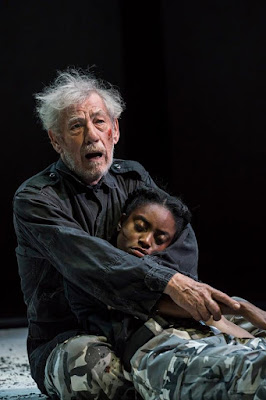James Karas
There is no reference to New
Year’s Eve in Johann Strauss’s Die Fledermaus but there should have
been. In any event it is frequently performed in late December as if the plot
does take place on New Year’s Eve and the Toronto Operetta Theatre is producing
it for five performances including one on December 31.
With its bubbly music, wonderful
arias and farcical plot, Die Fledermaus pretty much defines
what an operetta should be. TOT’s General Director Guillermo-Silva-Marin knows
that and knows how to entertain Toronto’s niche of operetta lovers.
Lara Ciekiewicz (Rosalinda) and Cian Horobbin (Alfred).
Photo: Gary Beechey, BDS Studios
The production is done sensibly
in English, a relief for those who may remember the Canadian Opera Company’s
2012 dreary, Freudian psychodrama of a production. Silva-Marin takes generous
liberties with the libretto and the result is very entertaining.
You recall that Gabriel
Eisenstein (tenor Adam Fisher), a well-off Viennese business man, has to spend
a few nights in jail because (in his unsubstantiated opinion) he had Dr. Blind
(Sean Curran), an incompetent lawyer as his counsel. He also has a friend named
Falke (Michael Robert-Broder) who has a score to settle with him. Falke is The
Bat of the title and he wants to humiliate Eisenstein and the plot twists are
his machinations.
Eisenstein has a beautiful wife
named Rosalinda. Alfred (Cian Horrobin) an opera tenor and old pursuer of
Rosalinda, is prepared to replace Eisenstein in her arms while the latter cools
his heels in jail.
In the meantime, the wily maid
Adele (Caitlin Wood) wants to go to a ball at Prince Orlovsky’s mansion, as do
Eisenstein and Dr. Blind. To cut to the chase, Mr. and Mrs. Eisenstein, Adele,
her sister Sally (Olivia Morton), and Dr. Blind all go the party in disguise. Alfred who happened to be wooing Rosalinda
when Frank (Janaka Welihinda) the prison governor came to pick up Eisenstein,
ends up jail. Are you still with me?
Now we have Strauss’s infectious
music, his sparkling and buoyant arias and a plot with mistaken identities that
provides opportunities for comedy.
Conductor Derek Bate has twelve
musicians in his orchestra and twelve singers for his chorus. That may not seem
like much of a force but seem and sound are not the same thing. The musicians
and the singers create energy and wonderful instrumental and ensemble singing
that simply belie their number.
There was inevitable unevenness
in the singing by the rest of the cast but overall they did justice to the
operetta and the full house in the Jane Mallet Theatre showed their
appreciation.
Adam Fisher (Eisenstein) and Lara Ciekiewicz (Rosalinda).
Photo: Gary Beechey, BDS Studios
Soprano Lara Ciekiewicz played
Rosalinda as a woman of statuesque beauty, class and vocal splendor. Caitlin
Wood’s Adele was effervescent, wily and a pleasure though I could have done
without the speech impediment she was given at the beginning.
Cian Horrobin’s Alfred was the
mythical tenor. Self-assured, exuberant, brash and a lover who can’t imagine
any woman saying no to him. Silva-Marin has interpolated half a dozen or so
arias or parts of arias by Puccini and Verdi for Alfred to show off his ardor
and his vocal prowess.
The multi-talented Elizabeth
Beeler played Prince Orlovsky, a role originally scored for a mezzo soprano and
frequently sung by a woman ever since. I have seen Beeler many times do fine
work but this time she was not at her best.
Silva-Marin leaves no politician,
celebrity or current event unturned when it comes to adding comic touches. He
takes on and expands the role of Frosch the jailer himself. Alfred gives him
singing lessons including points about posture – you have to be able to hold a
dime between your cheeks!
The plot of Die Fledermaus is wafer-thin
in places and prone to developing cracks if not handled properly and
Silva-Marin comes close to doing just that but overall the comedy works as does
the delightful production.
____________











